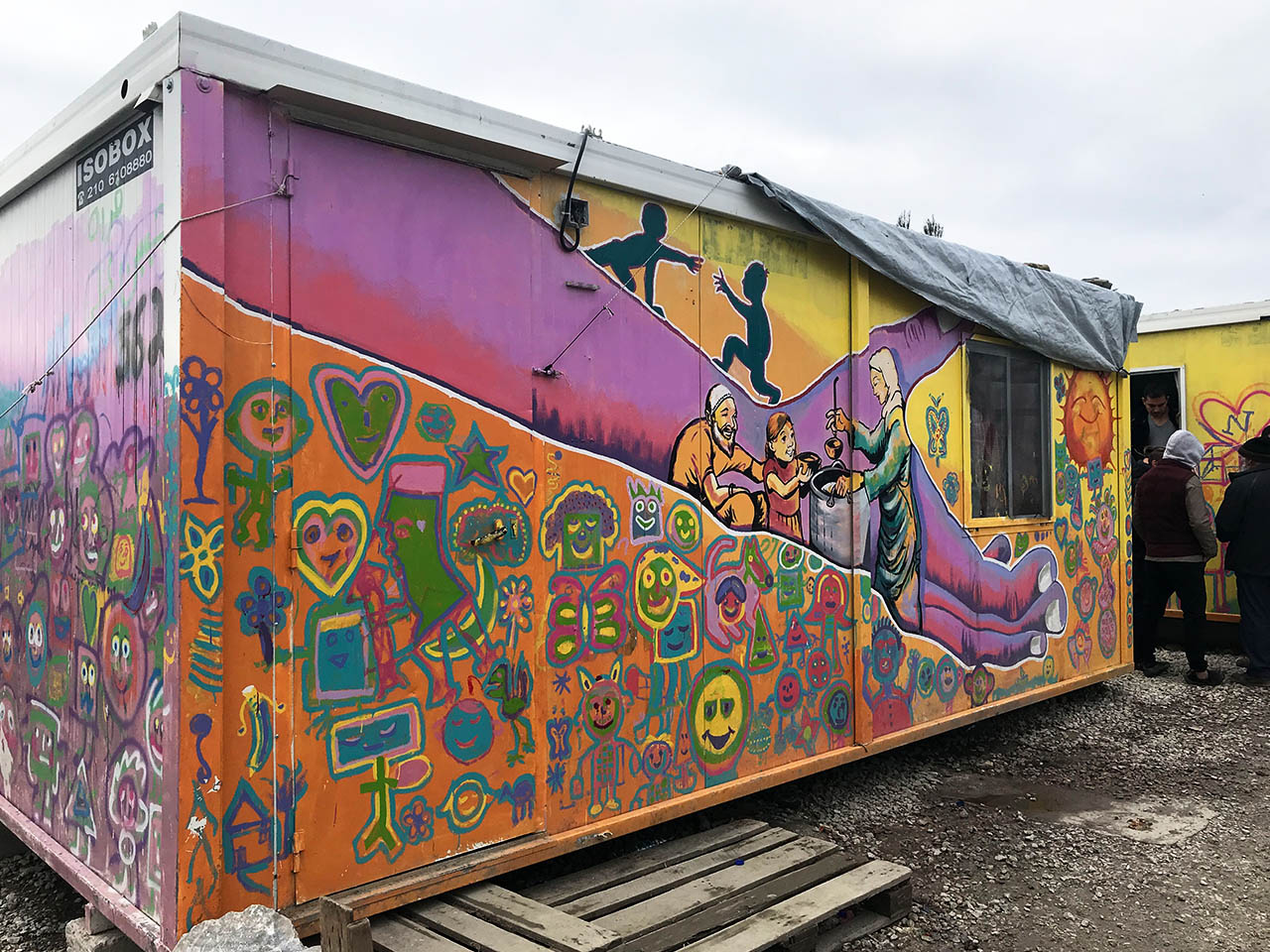 Aida* and her family fled Iran after violence erupted in their community. After an arduous journey, they finally had an opportunity to cross the Mediterranean, heading to Greece and a promise of a new life. Aida and her oldest son made it on the first boat, with her husband and two youngest children following on a second boat. Once she landed, she was horrified to learn that the second boat had been turned back to the Turkish Mainland. The rest of her family never made it and have since been sent back to Iran.
Aida* and her family fled Iran after violence erupted in their community. After an arduous journey, they finally had an opportunity to cross the Mediterranean, heading to Greece and a promise of a new life. Aida and her oldest son made it on the first boat, with her husband and two youngest children following on a second boat. Once she landed, she was horrified to learn that the second boat had been turned back to the Turkish Mainland. The rest of her family never made it and have since been sent back to Iran.
For Aida, being separated from her family is heartbreaking enough. Life has not improved for her since she arrived in Greece. For the past seven months, Aida and her oldest have been detained at the Moria refugee camp on the island of Lesbos. A camp built to hold 3,100 refugees, Moria has hosted as many as 10,000 at one time. Currently, there are 6,000 refugees, with many more coming in every day. Thousands are unaccompanied minors. They flee an unimaginable situation, only to find a hopeless alternative. Half are children, and hundreds are unaccompanied minors.
THE REFUGEE CRISIS
The United Nations Refugee Agency, UNHCR, has stated that currently more than 70.8 million people are forcibly displaced in the world, the highest numbers in recent history. Of these, 25.9 million are defined as refugees and are protected by international law. They have fled war, violence, conflict or persecution, and have crossed an international border to find safety. The UNHCR helps place refugees in countries, ensuring their rights as refugees are respected and protected, but with the numbers of refugees today, that’s easier said than done.
Many refugees end up in refugee camps. Meant to be a temporary settlement to receive refugees and people in refugee-like situations, they accommodate displaced people who have fled their home country in large numbers. Because it is meant to be temporary, most refugees living in camps are unable to work, and children often do not have access to education. Conditions can be hard in a camp, including food and water shortages, overcrowding, unsanitary conditions, disease outbreaks, inadequate shelter, hopelessness and violence. More than 2.6 million refugees live in camps around the world, with millions more living in surrounding urban areas and informal dwellings. More than 85% of refugees are hosted by developing nations, who are already struggling to provide basic needs for their own people.
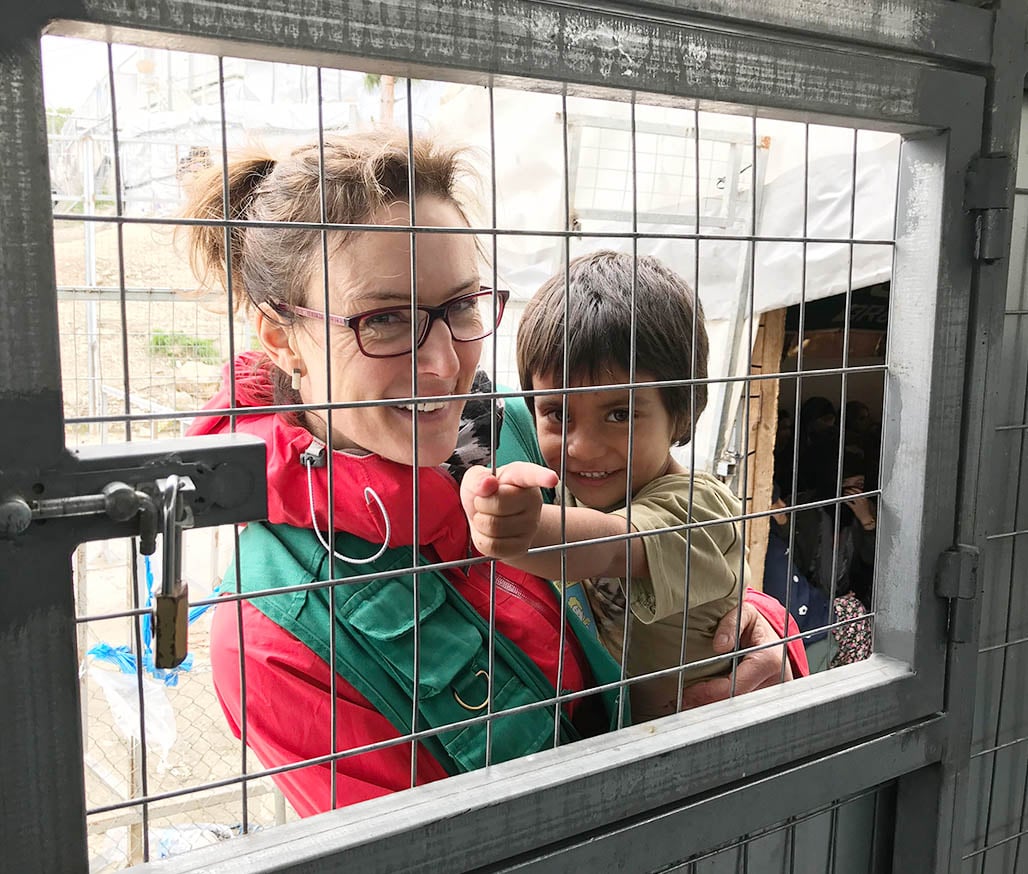
A CHURCH AND AGENCY PARTNERSHIP
When the main refugee crisis hit Europe in 2014-2016, refugees from the Middle East would pass through Greece quickly and head to other countries, like Serbia, Germany, Italy and Sweden. Reach Beyond missionaries in Romania, Dave and Beth Jolly, had an opportunity to help the refugees through their church, Harvest Arad. Beth was able to go on a mission trip to Serbia with the Romanian church to serve refugees, alongside Remar S.O.S., a Christian NGO working with marginalized people. However, as European countries began closing their doors, refugees had to find another route, and the opportunity in Serbia came to a close.
Then, a door opened for ministry in Greece. The European Union had made a deal with Turkey to curtail the flow of the refugees coming to Europe. Millions of refugees are currently waiting in Turkey. Yet thousands of refugees are still making it to mainland Greece and the Greek Islands. Remar was again working on food distribution in the Moria refugee camp on the island of Lesbos, but they needed help. So, they contacted Harvest Arad.
In February, Dave Jolly joined a small team from Harvest Arad and invited Martin Harrison, a Reach Beyond UK missionary with expertise in community development, to go with them. The international group of two Americans, two Brits and three Romanians served alongside Remar. In March, Dave and Martin each returned, leading separate fact-finding teams to better assess the felt-needs of the refugees on Lesbos and determine how Reach Beyond could work with churches to provide more help. Dave returned with another Harvest Arad team, and Martin returned with members from two UK churches, Skipton Baptist Church and St. Mark’s Harrogate. Martin’s team included Dr. Sarah Hattam, who helped explore the level of medical care on Lesbos.
These trips offered exciting opportunities for the Church and Reach Beyond to serve and collaborate side-by-side and create a long-term strategy. The churches came with a desire to engage more deeply in the refugee crisis, by connecting with refugees, serving them and learning from them. Likewise, Reach Beyond wants to play a role in equipping, assisting and walking alongside the Church to proclaim and demonstrate the Gospel.
“We can all learn from each other and seek to build God’s kingdom rather than our own,” said Martin Harrison. “It was one of the highlights of the trip for me to have a thoughtful, observant and gifted team around me as we explored together the different possibilities for future refugee ministry for Church and Reach Beyond. We’ve investigated, learned and worked together. The Church and its people have been mobilized to do something and make a contribution they didn’t think they could.”
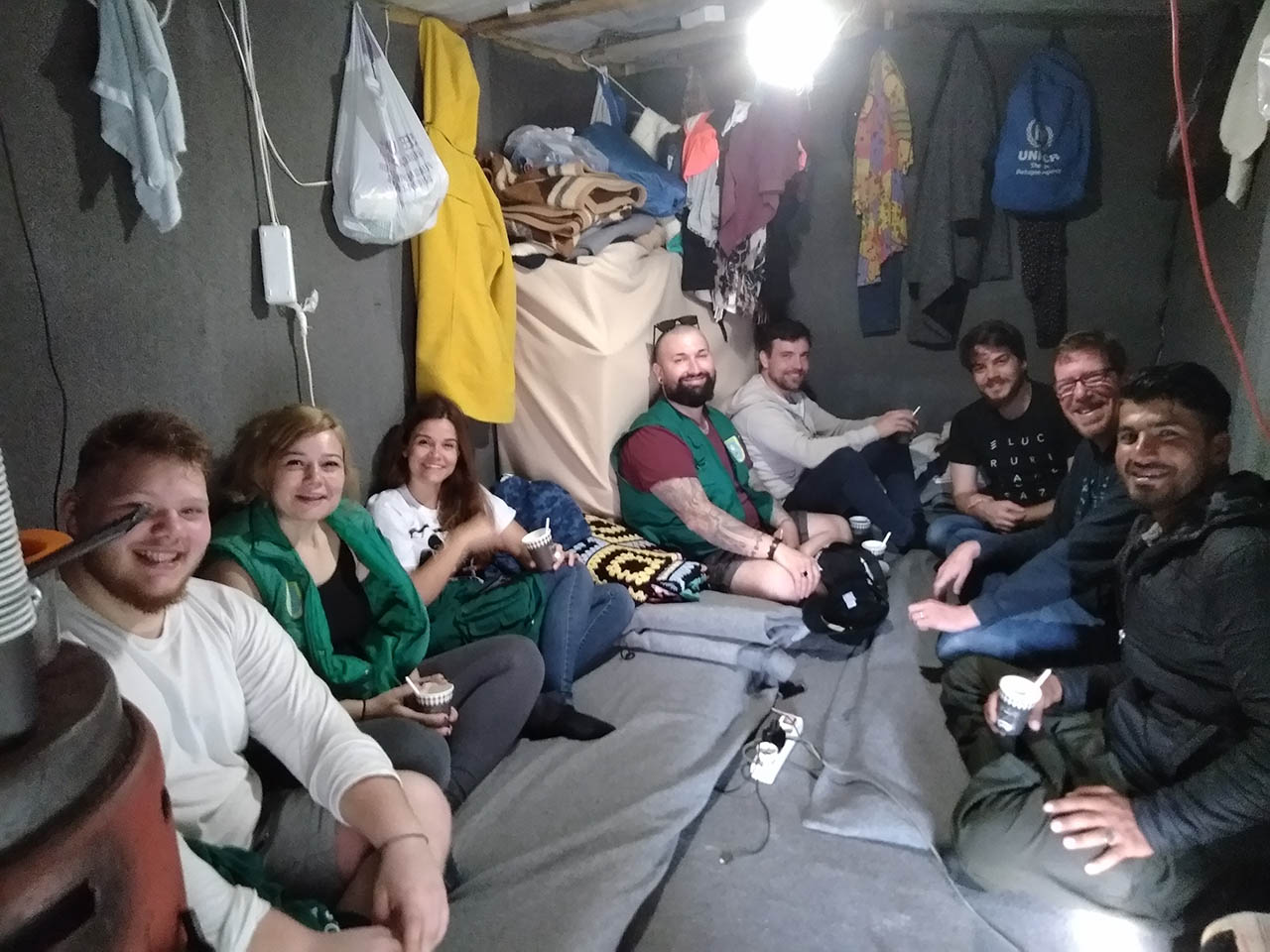
SERVING IN A THIN PLACE
Julia Watts, a trip participant from St. Mark’s Harrogate, called Moria a “thin place,” saying “the Kingdom of Heaven is so very near! You can see and experience God at work in much clearer ways than at home. God is so present here. It’s so evident that His heart is heavy for these people.”
Since the peak of the European refugee crisis in 2015, Moria and Kara Tepe have been the two active refugee camps on the Greek island of Lesbos. Moria is the initial detention camp that refugees are brought to after they come ashore. From there, some families and vulnerable people are moved to the Kara Tepe camp, which is somewhat smaller and perhaps safer. However, many vulnerable people do not get transferred there.
The remaining refugees are housed at Moria until such time as their asylum requests are processed – a process which can take months, if not years! Refugees are returned to their home country or Turkey if their asylum request is denied. If they are successful, then refugees are eventually transferred to the Greek mainland, where they are allowed to remain, but not necessarily with the freedom of movement across Europe. They then struggle with adapting to a new culture and language, in a country already struggling economically with a refugee crisis forced upon them.
While the politics, economics and sociology of the refugee crisis is complex, what is plain to see is that the refugees are often not cared for or well-treated. For this reason alone, the Church has an opportunity to demonstrate the love of Christ by caring for them. It’s more than an opportunity; caring for refugees is Biblical. Leviticus 19:33-34 (NIV) says, “When a foreigner resides among you in your land, do not mistreat them. The foreigner residing among you must be treated as your native-born. Love them as yourself, for you were foreigners in Egypt.” Jesus also instructed His disciples, “For I was hungry and you gave me something to eat. I was thirsty and you gave me something to drink, I was a stranger and you invited me in … whatever you did for one of the least of these brothers and sisters of mine, you did for me.” – Matthew 25:35, 40 (NIV).
n the Moria camp, the majority of refugees are from Afghanistan, with some also coming from Syria, Iraq, Iran, Somalia and the Democratic Republic of Congo. In all, there are or have been 49 different nationalities! The vast majority of refugees are people from countries that are hostile or closed to the Gospel. We might not be able to reach them in their home countries, but circumstances are now bringing them to our doors. God has provided His Church with a unique opportunity to show Christ’s compassion, love and action to people who are in great physical, emotional and spiritual need.
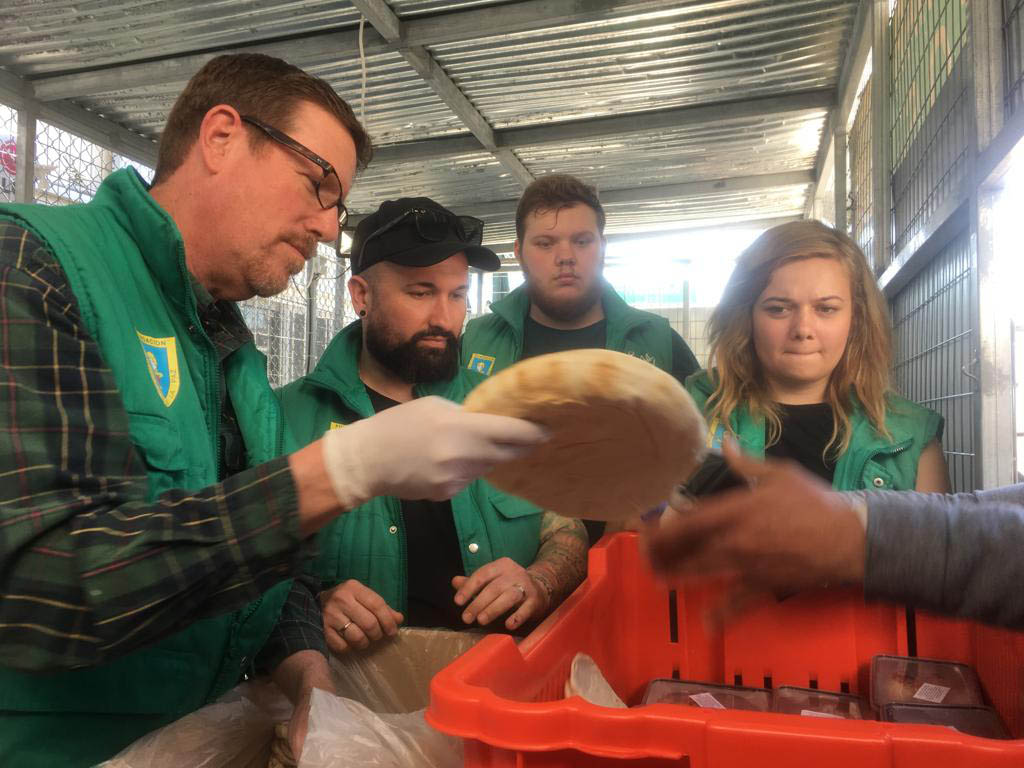 FEEDING THE THOUSANDS
FEEDING THE THOUSANDS
The primary role the teams played was in supporting Remar with food distribution. In principle, the task of distributing food and water is not difficult, and the supplies are provided by the Greek government. However, given the number of people requiring food and the tensions that occur in the line as people wait, plus the variable weather conditions and food quality, the task becomes much more complex and challenging for a mission team. Meals are distributed three times a day at 7:30 am, 12:00 pm and 4:00 pm. The team has to be there approximately one hour beforehand each time to take delivery of supplies.
“Camp life here is tough, even for the able-bodied. But if you have a disability or an injury, life is a constant struggle, if not impossible. Heavy rain meant wet conditions and little sleep, resulting in a tense breakfast run for us,” said Julia. “A heavy police presence added to the menacing atmosphere. The men queue under cover, but the women – even those elderly, pregnant or diabetic – queue out in the elements. Food goes out rapidly, so if you snooze, you most definitely lose.”
Because food and water are essential, this isn’t a task that can take a day off. Remar’s lead had been working for over a year without a single day off. Volunteer groups to assist are desperately needed.
SIMPLE SOLUTIONS THAT IMPROVE LIVES
On the first visit to the Moria camp in February, the team learned of a serious problem, especially for women and children. While the camp is safe during the day, at night the picture gets more insidious. There are problems with drinking, drugs, fighting, human trafficking, prostitution, violent attacks and rape of women.
A simple trip to the toilet at night can become quite dangerous, as men make lewd remarks, expose themselves and commit sexual violence. Some women in the camp are suffering from PTSD (Post-Traumatic Stress Disorder), either from experiences in their home country, or experiences on the route to Lesbos, which escalates their fears at night. Many women have resorted to the indignity of wearing improvised diapers so they don’t have to leave their accommodation. Others suffer in silence and wait for dawn or perhaps urinate out in the open next to their tents or their Isobox container “homes,” causing a public health issue.
With all this in mind, the team set out to find some answers and possible solutions. Dr. Sarah, Julia and staff from a partner organization, sat down with women refugees on three different mornings to build trust, relationships and learn more.
“This was a huge answer to prayer since we had no idea whether the Muslim women would open up about such a sensitive topic,” said Martin. “There was nothing to worry about! The women were incredibly touched, some almost to tears, that people would be interested in their wellbeing and health, and that they were proposing workable solutions.”
Sarah and Julia showed the women two devices, a “uri-tainer” and a “she-wee,” that make it easier for women to urinate into a container in their shelter at night, to be taken and disposed of properly in the morning. Most preferred the “she-wee” because it was small, discrete, and easy to clean. Sarah and Julia distributed almost 80 devices, and we plan to gain feedback from users on follow-up trips.
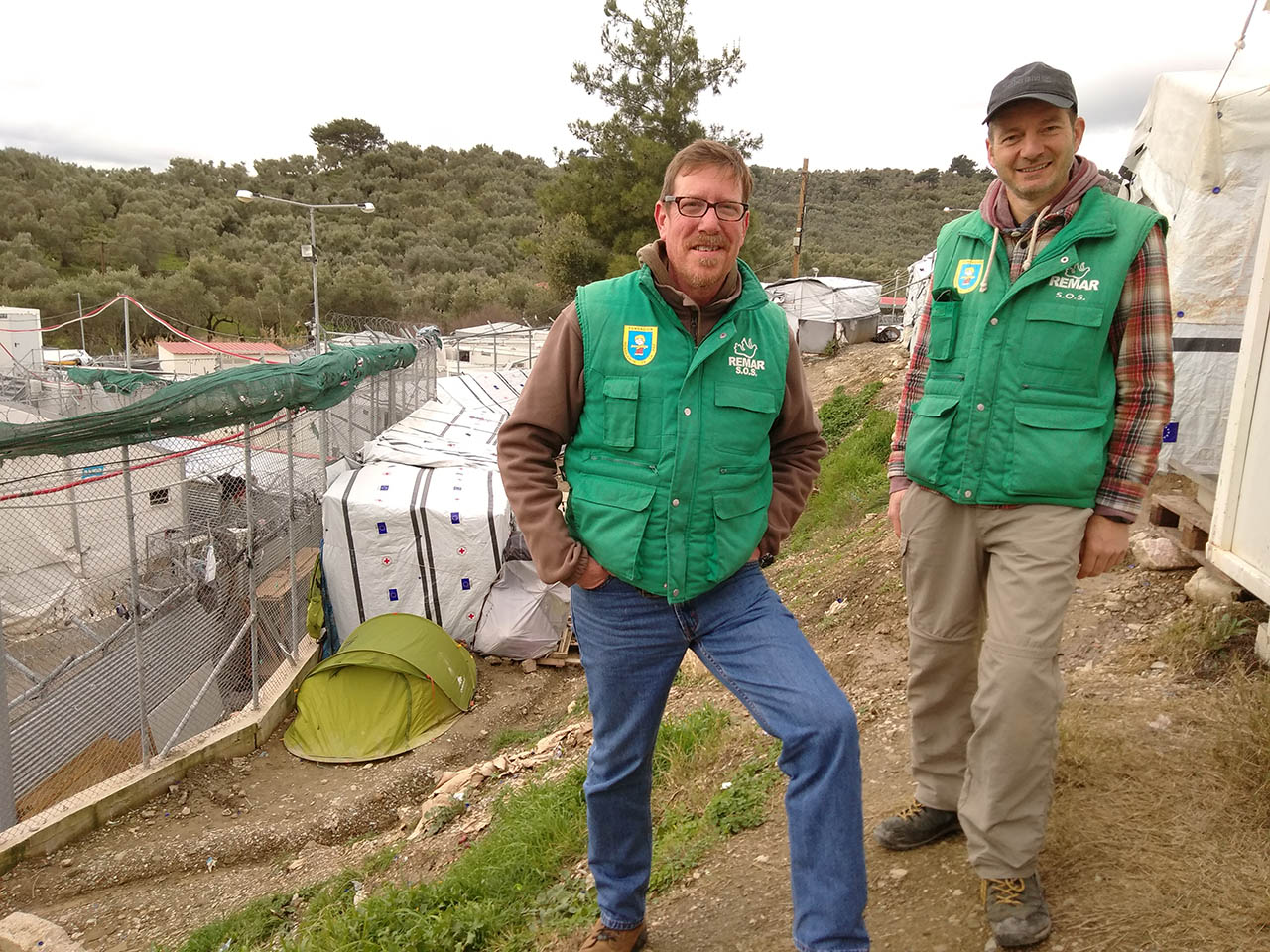 NEXT STEPS FOR DEEPER INVOLVEMENT
NEXT STEPS FOR DEEPER INVOLVEMENT
Another team trip of missionaries and U.S. staff is planned for July, with the hopes of eventually sending monthly teams to support the two Christian organizations working in the Moria camp. In addition to helping with food distribution, the team will explore options to provide additional medical care, counselling, health and hygiene education, construction and English learning through an English Conversation Club. All of these options are an answer to the felt-needs addressed to date, using a strategy put together by both the church participants and Reach Beyond staff. The door has been opened for meaningful, ongoing ministry, including short-term and long-term options.
Mike Holmes, from Skipton Baptist Church, hopes to see more churches get involved. It’s not only an opportunity to demonstrate the love of Jesus among a vulnerable people, but also an opportunity to participate in God’s plan. “What an amazing discipleship experience for everyone,” he said. “We’ve learned new things about God, about faith and trust, and about how He works. We’ve so clearly experienced His presence and His divine timing.”
*name changed for security and privacy.
Statistics provided by the UNHCR 2018 Global Trends Report.
